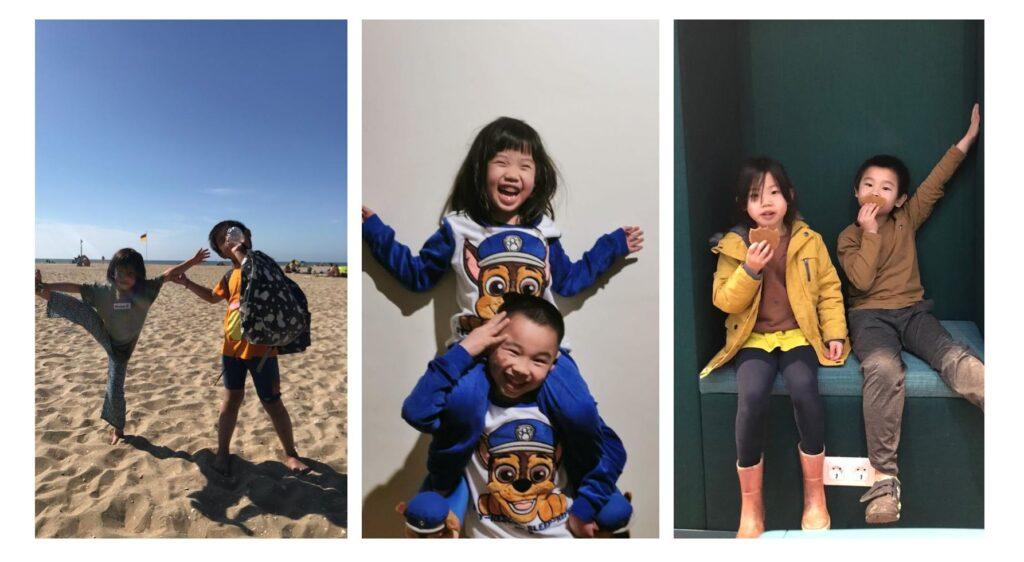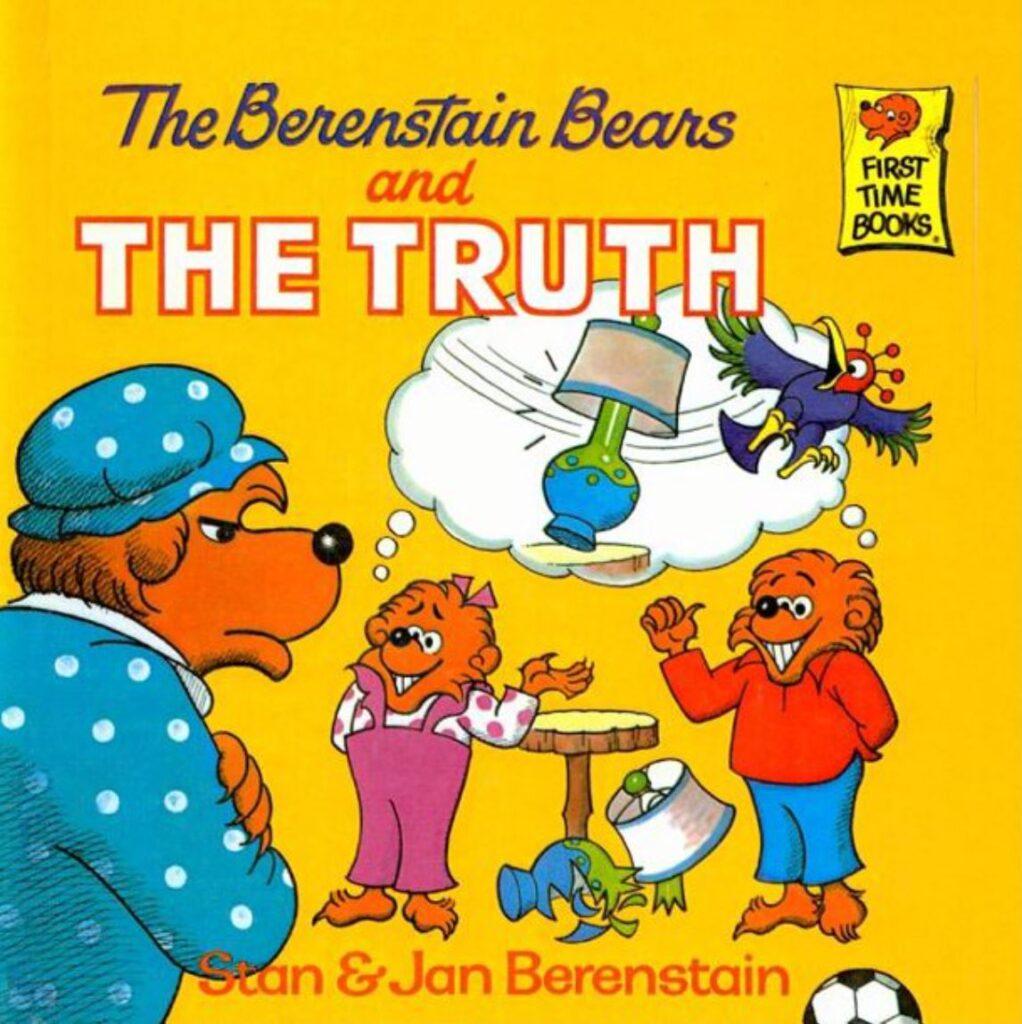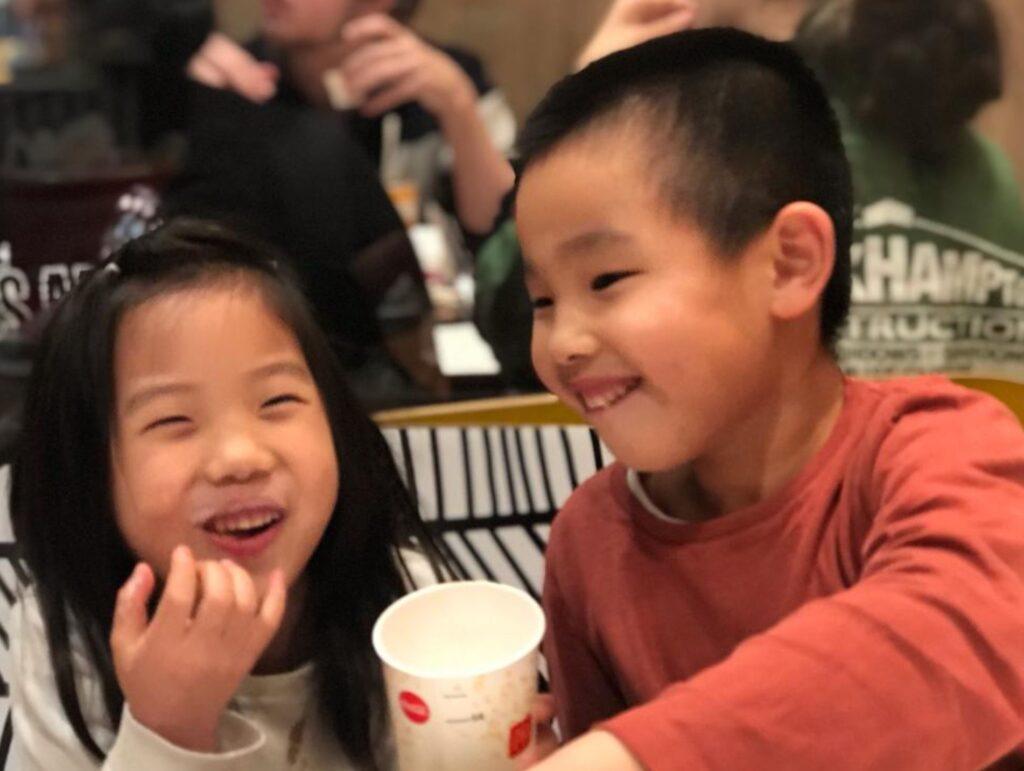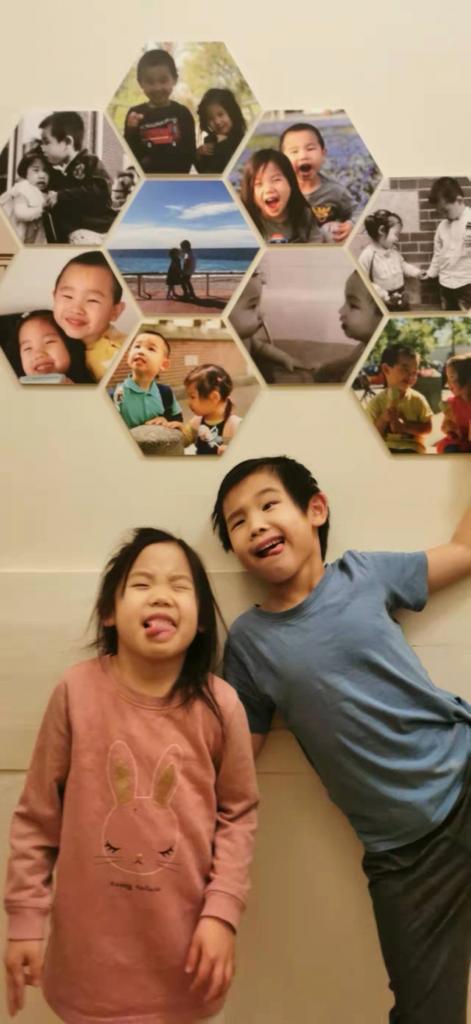Dear mamas and papas, have you ever experienced kids lying to you? I do not mean the cute lies like “I did not eat the chocolate cake” while the hands and mouth are brown. But the things shocked you. We experienced it last week, which made me write this article about why kids lie, and what to do when you find out kids are lying.
Related Reading:
- 8 Best Positive and Gentle Parenting Books for Toddlers’ Parents
- 8 Youngest Child Traits: Does Birth Order Matter?
Table of Contents
What Happened in the Lego Camp
Last week, my two kids Yojan (boy, 7) and Minghe (girl, 6), attended a 4-day Lego Camp. The instructor teamed up kids in pairs, and made Yojan and Minghe to work with each other. At the end of day 1, the instructor called us into a small room and told us the two were fighting one tiny Lego figure. Yojan got angry and shouted something terrible to Minghe: “I will sell you on the open market for 1 Euro, you will have no parents, no home. And I will flush you into the toilet, you will swim in the sea alone”. Moreover, he told the instructor, “Papa and mama say the same thing at home. “ I fully understand the instructor was entirely shocked and need to find out what is going on. When she asked us, I felt she was about to call the police if my answer was suspicious.
Related Reading:

Parents’ Point of View
I swear to God that the closest thing we have ever done is: to put the two on our shoulders while they are still toddlers and simulate the open market seller “fresh strawberry, 1 euro~~!” Sometimes we exchange them like the fisherman in pike place market in Seattle at a much closer distance. Then we changed the fruit or vegetable name and tickling them. We played these joyful games for two years until they got too heavy to carry. We are even proud of that.
After a few years, I could not believe it had turned into a scary story from my son’s mouth. As a sibling, the two have a terrific relationship most of the time. They hug each other daily, say “please” and “thank you,” do chores together, play music together, and cheer for each other. We were shocked and wondered why this was happening.
Honesty is highly valued in most families. We did our best to create an open, trusting relationship with our kids. And expect they will grow up to be truth-telling, integrity adults. Or minimum, do not cheat in school or be pulled over for drinking. I dug in and read all information about lying, and here is something want to share with you.

Why Do Kids Lie
It is natural to feel hurt, angry, shame, and frustrated when parents catch their kids in a lie. But same as adults, lying is a typical children’s behavior in their development, which has nothing to do with their character or morality. Your children try to solve a problem in an ineffective and immature way.
Related Reading:
- What to Do When Family Members Hurt You
- 8 Youngest Child Traits: Does Birth Order Matter?
- 10 Signs of Toxic Parenting and How to Deal with It
Why are they doing it?
1. They mix reality and fantasy
When kids are still young (2~4), they cannot distinguish between reality and fantasy. They probably imagine a monkey in the class or Santa knocking on the door and thinking it happened. That is why kids believe in Santa or other fairytales. Parents can encourage their imagination and enjoy the moment in those cherished moments.
It also can be wishful thinking. For example, children know they did something wrong and wish it did not happen. Instead of saying I wish it is not me,” they will say, “it is not me.”

2. Getting attention
Similar to screaming or tantrums, any attention, even bringing them trouble later, will encourage the behavior. Think about ourselves. How many we have fidgeted with the truth or exaggerated a claim to feel important? The same is valid with kids; they’ll sometimes lie to bolster their self-esteem or feel like a big boy or girl.

3. Avoiding consequences (trouble)
Perhaps the most apparent reason for both adults and kids lies. They’ve cornered into a situation that could be punished, such as forgetting homework to do or failing an exam. It seems like it is the only way they know to deal with the problem or conflict, more like a survival skill.
4. White lie to not hurt others
Instead of being polite, this lie can be an essential social skill. Most likely, we teach our kids this sophisticated lie: “Tell Grandma you like the sweater even if you don’t”. With all the justifiable reasons, it is still bending the truth.
When Do Kids Start Lie
Lying is not an easy thing, and it requires sophisticated thinking. Kids not only have to imagine something that is not true, but they also have to anticipate how others will respond to their tale, remember the story they create to maintain it, and control the impulse to blurt out the truth.
2-4 years
More recent research has found that most children learn to lie effectively between 2 and 4. These first lies often focus on denying misbehavior and may involve wishful thinking more than deliberate efforts to deceive. From the perspective of young children, if they say they didn’t do it, their parents won’t be mad, and it will magically erase their misbehavior!
Lying in young children is a good sign that they are developing in “theory of mind,” which means that children discover that their minds and needs are separate from others. And they know others’ thoughts and feelings and try to answer from the other person’s perspective. This ability is an essential social skill related to empathy, cooperation, and care for others when they feel upset.
4-7 years
Between the ages of 4 to 7, kids are still unclear about the distinction between reality and fantasy. They can tell you about imaginary friends and getting creative with their lies, and they also insist that this fantasy world is real. Kids this age tend to lie to avoid trouble.
8-12 years
Children aged 8 to 12 understand what it is a lie. They frequently lie to find out what they can and cannot get away with. This is when lies about homework or other unpleasant tasks, such as musical instrument practice, can be expected. At this age, lying tugs on their conscience, and they begin to feel guilty for lying.
Pre-teen and teens
Pre-teens and teens can lie for various reasons, including not relationship, or peer pressure, etc. At this age, they are entirely aware of their lies’ repercussions and understand they have a choice. One study found that 82% of US teenagers in the past year admit lying to their parents about friends (67%), money, alcohol/drugs use (65%), dating, parties, or sex (32%).
When Should We Worry
Without any complex rules, Dr. Cordiano describes three patterns that could indicate a more serious problem with lying:
- If kids often lie in various scenarios.
- When the kids potentially put themselves in dangerous situations, they lied about it.
- Ultimately, if the deception started to harm the parent-child relationship.
What Parents Should Do or Not Do
Naturally, we would like to punish kids when they lie to us to ensure it does not happen again. It can work for the following week, but not for the long run. On the contrary, when we punish kids for lying, they will keep doing it to avoid future punishment. Like adults, lying is a faulty problem–solving skill for kids. Parents need to teach them how to solve those problems more constructively, directly talking or addressing the underlying behavior. Meanwhile, we also need to create an environment where they feel safe telling the truth.
Related Reading:
- 7 Old-fashioned Discipline Techniques You Should Avoid At All (on primary school kids)
- 10 Fun Sibling Games To Heal Sibling Rivalry
- 15 Creative Family Photo Ideas
1). Provide a safe environment
- Keep calm and do not get angry
You must feel ashamed and betrayed if you catch your children in a severe lie. The best way is not to react right away. Give yourself a moment to digest the information and figure out the reason behind the lie. You can discuss it with your spouse or a trusted friend to consider handling the situation.
- “I love you even if you make mistakes.” “I may not like your behavior today, but we always love you.”
- “Appreciate honest, and no one will be punished.”
Getting kids to promise they will tell the truth before we ask what happened increases the chance that they will be honest. Getting that promise makes it clear what you want from your child and puts the value of honesty right at the front of your child’s mind.
When they open up with the true story, praise them with “I appreciate you telling me what happened. That must have been difficult, but I am glad you are honest and share responsibility.”
- Never corner your child
If you know the answer already, do not set up a lie. Ask your kids, “did you clean up your room?” while you already knew the mess in their room. This action only sets kids up to lie and feel guilty for their actions.
Instead, skip the question and emphasize ways to address the situation. “What is your plan to clean up your room?” This can prevent a power struggle and allow your child to save face by focusing on an action plan rather than making an excuse. It also teaches them how to avoid problems in the future.
- Don’t label your child as a liar
Calling a child a liar is a huge mistake. The wound it leaves behind is more painful than dealing with the original lie. “Mom won’t believe me,” he thinks. He will feel bad about himself and may encourage him to lie in the future.
2). Get the whole story
When talking with kids, understand the reason and background instead of focusing on the fact that they lied. It can help you get the root causes and understand the truth. Open up the conversation gently with the reality, for example, “I got a call from your school, said you reported ill. Can you tell us what happened today?”
3). If you could have a do-over and how to fix it now
Like every other mistake, if there is still an opportunity to solve the situation, ask your kids to help correct the error. For example, if she lies about spilling milk on the floor, ask her to assist wipe the floor. If someone else was harmed – perhaps he broke his sister’s toy – ask what he can do to fix it. Thus, they can be accountable for the mistake and demonstrate to kids that they can correct mistakes rather than lie about them.
Also, ask your kids if they could do it all over again, what would they do differently?” and brainstorm different options. Consider mistakes as a way to learn how to make better decisions.
4). Explain why lying is wrong and has its consequences
If your kids breaks something or makes a mistake, tell him calmly that mistakes are common and inevitable. However, lying about it is unacceptable, and he must accept his mistakes. This will help them understand that they won’t have to lie to cover up a mistake the next time. Explain that lying can damage the trust between people who love each other. Ask your child to imagine how she might feel if you lied to her about something. Would she doubt you the next time? Would it affect the way she trusted you?
5). Set up an example and limit your white lie in front of kids
“I am stuck on the highway” while you are late on departure, “I love your dress so much” while you commented, “the dress is so ugly in the car.” Children can pick up a lot of behaviors from their parents. As a result, you should not lie in front of your children. Moreover, refrain from telling too many white lies. Although it is necessary for your child to learn them as he grows older, it can send mixed signals about what types of lies are acceptable. Rather than assuming that your child will eventually figure it out, try limiting your white lies until your child understands why they are being told.
No matter how much you talk about the importance of honesty, you undermine the message if children see you are being dishonest.
6). Spend quality time with your child
If your child lies to get attention, spend quality time with them to establish a comfortable relationship and allow them to approach you without hesitation.
Related Reading:

7). Share inspiring stories
We all know the story about George Washington with the cherry tree and the boy who cried wolf. There are also many other stories cherish for honesty can inspire kids. Do not forget to share your own story as well.
8). Change to positive words
Keep in mind the distinction between saying “It’s bad to lie” and “It’s important to tell the truth.”
We do not shame children when we keep our words positive and do not compromise our authority or the importance of the message. Negativity can also lead to them labeling themselves as inadequate or encouraging them to conceal their transgressions.
9). Give Your Child reasonable Consequences
When your child lies, consequences must be imposed rather than punishment.
What’s the distinction? Discipline is motivated by rage, whereas results are concerned with correcting the misbehavior. For example, if your child lies about doing her chores, talk to her about the importance of owning up to her actions, work with her to come up with an appropriate task to compensate for her mistake, such as doing extra chores around the house.
10). Be Clear About Expectations – Family Rules
Tell you children the truth is just as crucial as other good behavior you expect from her, such as speaking to you respectfully, not talking back, or trying not to fight with her siblings.

Useful Books about Lying

Final Thoughts from Pragmatic Lifestyle
Lying is common in both kids and adults. A University of Waterloo study of children in their own homes discovered that 96% of young children lie at some point. Four-year-olds lie every two hours on average, and six-year-olds lie every hour on average.
Hearing your kids outright lie is never pleasant, but understanding why kids lie can help you respond more effectively. After all, children lie for a variety of reasons, such as avoiding consequences or blurring facts.
Please don’t bother asking if they did the deed or not, as this encourages them to lie or feel ashamed. Instead, be compassionate and use positive language. Reward her for telling the truth and enlist her assistance in correcting the mistake.
Have discussions with your children about lying and telling the truth. ‘How would Mum feel if Dad lied to her,’ for example.
Please assist your child in avoiding situations in which they feel the need to lie. If you ask your child if they spilled the milk, he or she may feel tempted to lie. To avoid this situation, you could say, ‘I see there’s been a milk spill, and let’s clean it up.’
Recognize your child for owning up to a mistake. ‘I’m so glad you told me what happened,’ for example. Let’s work together to solve this problem.
In the end of the day, we calm down, recap the situation and had a family talk.
After Dinner, We had a Family Talk (Papa, Mama, Yojan, and Minghe)
Everything was peaceful and quiet again when we got home and after dinner. We started our regular after-dinner family talk.
Mama: Yojan, can you tell us what happened today?
Yojan: Minghe and I fought. She is not pleasant to me
Mama: What did Minghe do?
Yojan: Each of us has 1 Lego figure she wants to mine, and I did not give it to her, and she stole it from me.
Papa: Minghe, is that true from Yojan? Why do you want to have two figures?
Minghe: Yes, I want to make a friend scene, but I only have one figure, so I took Yojan’s figure.
Because you are my big brother
Papa: I see. Have you asked the teacher to give you another one?
Minghe: No, she is a bit far at that moment
Mama: Why do you take Yojan’s figure?
Minghe: Because he is my big brother
Papa: Do you take the figure if you are with others?
Minghe: No
Yojan: You are nice to everyone, except to me!
I do my best to control my behavior
Mama: Yojan, I see you are still angry. Can you tell us what happened next?
Yojan: I shouted to Minghe, and I said I would sell her on the open market
Papa: Do you mean it?
Yojan: No, but I was too angry at that time. I mean it.
Mama: I understand you must be outraged then, especially someone you love so much does this to you
Yojan is full of tears
Mama: Did you do anything else than shout at Minghe?
Yojan: No, I am very angry, but I did not hit her.
Papa: Thanks, Yojan, it is a lot of effort. You did an excellent job of controlling your anger.
Papa: Minghe, Yojan is your brother, and I understand you share many things. But if Yojan does not want to share his things, can you respect that?
Minghe: But I want to have two Lego figures
Papa: More than drive Yojan angry? Do you think you can find a better way?
Minghe: I can ask the teacher if she can give me another one
Papa: Anything else?
Minghe: I can also wait till tomorrow to bring one from home.
Mama: That is all fantastic ideas, Minghe, do not take Yojan’s kindness as granted. And do not take things without asking.
Minghe: But he is my brother…….
Mama: Next time, can you imagine he is not Yojan? Maybe he is Kevin in your class, would you do the same?
Minghe laughed
Minghe: Kevin? I think Yojan is cool than Kevin
Yojan also laughed
Yojan: Of course!
Papa: Minghe, what do you do?
Minghe hugged Yojan
Minghe: Sorry, Yojan, I will not steal your things again. I love you.
Yojan is cool now
Yojan: Minghe, I forgive you. But do not do it again. I was very angry.
The words hurt, and it is not your responsibility to discipline her
Mama: Yojan, do you understand those words hurt Minghe?
Yojan: Yes
Mama: If she is Elin in your class, what do you do if she takes your stuff?
Yojan: I will tell the teacher.
Mama: Will you be angry with Elin?
Yojan: Yes
Mama: Are you going to say those words to Elin?
Yojan: No
Mama: Why is that?
Yojan: Elin is not my sister.
Papa: Do not assume you can punish Minghe because you are her brother.
Discipline you two is mama and papa’s job. You just have to love each other and play with each other. If you two cannot play along, you can assume they are not your brother or sister, but someone else in your class. No hitting, no shouting, and no stealing. Is that OK?
Yojan hugged Minghe:
Yojan: Sorry, Minghe, I love you.
Minghe: I love you too.
Telling the untruth hurts Papa and mama
Papa: OK, that is the sibling fight’s part. Let’s move on to the next. Yojan, we chatted with the teacher, and what you said surprised us and hurt Papa and mama.
Yojan: Sorry
Papa: Yojan, did we say “sell Minghe” at home?
Yojan: Sometimes she is on your shoulder, and we say bring her to the open market.
Mama: Do you know we are playing a game?
Yojan: Yes
Mama: Did you have fun while we were playing?
Yojan: Yes
Mama: Do you know people get scared when they hear this?
Yojan: No
Mama: Why do you say that?
Yojan: The teacher looks angry, and I am afraid she is going to punish me
Papa hugs Yojan, and the little man starts to cry.
Papa: How do you feel now?
Yojan: Better and Sorry
Papa: We knew it was a tough day for you, and let’s discuss how we can prevent such things from happening tomorrow. Is that OK for you?
Yojan: Yes. (And the two are happy after so far)

About Me
Hi, there. I am Lin. Together with my husband and two kids, we live in the beautiful Netherlands in Europe. I am dedicated to self-development, creating quality time for the whole family, and fully supporting kids with their potentials with all I have learned from engineering, MBA, and 10+ years of working experience in the energy sector.




8 Comments
Comments are closed.